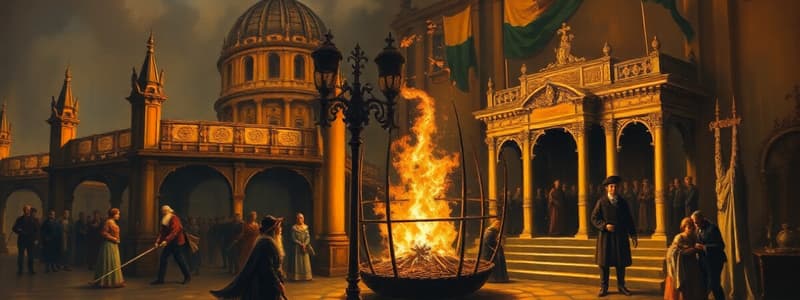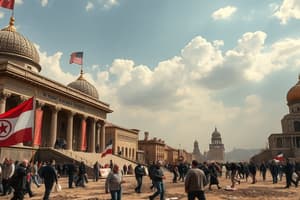Podcast
Questions and Answers
According to Huntington's thesis, what is the primary factor driving global divisions in the post-Cold War era?
According to Huntington's thesis, what is the primary factor driving global divisions in the post-Cold War era?
- Political ideologies
- Economic systems
- Military strength
- Cultural differences (correct)
Which of the following is NOT identified as a major civilization in Huntington's framework?
Which of the following is NOT identified as a major civilization in Huntington's framework?
- Sinic Civilization
- Islam
- African Civilization (correct)
- The West
What is the key distinction between modernization and Westernization, according to the content?
What is the key distinction between modernization and Westernization, according to the content?
- Modernization involves adopting Western political systems, while Westernization focuses on economic development.
- Modernization is a superficial adoption of Western elements like fast food, while Westernization involves deeper cultural change.
- There is no distinction; the terms are interchangeable.
- Modernization is the desire for wealth and technology, while Westernization involves adopting Western culture. (correct)
Which of the following best describes Huntington's view on the role of national interest in foreign policy?
Which of the following best describes Huntington's view on the role of national interest in foreign policy?
In the context of the Balkans, how did external support align during the breakup of Yugoslavia?
In the context of the Balkans, how did external support align during the breakup of Yugoslavia?
Which of the following is presented as a unique element of Western culture?
Which of the following is presented as a unique element of Western culture?
What is Huntington's recommendation regarding US intervention in foreign affairs?
What is Huntington's recommendation regarding US intervention in foreign affairs?
According to the content, what is happening to the influence of the West?
According to the content, what is happening to the influence of the West?
Which nation does Huntington identify as the leading state of the Orthodox civilization?
Which nation does Huntington identify as the leading state of the Orthodox civilization?
What should the United States do in response to the idea of the 'Clash of Civilizations'?
What should the United States do in response to the idea of the 'Clash of Civilizations'?
What is a potential flashpoint described in the text?
What is a potential flashpoint described in the text?
Which country has modernized without fully Westernizing?
Which country has modernized without fully Westernizing?
Which of the following describes the primary focus of the book "The Clash of Civilizations and the Remaking of World Order"?
Which of the following describes the primary focus of the book "The Clash of Civilizations and the Remaking of World Order"?
Why does Islamic civilization potentially face internal divisions and conflicts, according to Huntington?
Why does Islamic civilization potentially face internal divisions and conflicts, according to Huntington?
What did Prime Minister Mahathir of Malaysia assert during a meeting in Bangkok?
What did Prime Minister Mahathir of Malaysia assert during a meeting in Bangkok?
What general advice does the content give regarding U.S. trade policy with China?
What general advice does the content give regarding U.S. trade policy with China?
What does Huntington suggest the U.S. should do regarding legal immigration?
What does Huntington suggest the U.S. should do regarding legal immigration?
Which event led to initial euphoria and hopes for a Western-dominated world order?
Which event led to initial euphoria and hopes for a Western-dominated world order?
What factors enabled the West to modernize and influence the world?
What factors enabled the West to modernize and influence the world?
What is Huntington's view on conflicts within Islamic civilization?
What is Huntington's view on conflicts within Islamic civilization?
Flashcards
Clash of Civilizations
Clash of Civilizations
Future global divisions will be based on cultural identities rather than political ones. Western dominance will face challenges from thriving Muslim and East Asian societies.
Cold War World Order
Cold War World Order
The Cold War world was structured into the 'free world' led by the US, the communist bloc led by the USSR, and the non-aligned Third World.
Key Civilizations
Key Civilizations
The West (North America and Western Europe), Islam, Orthodox Civilization (led by Russia), Chinese or Sinic Civilization, Hindu Civilization (led by India), and Japan.
Unique Elements of Western Culture
Unique Elements of Western Culture
Signup and view all the flashcards
Modernization
Modernization
Signup and view all the flashcards
Westernization
Westernization
Signup and view all the flashcards
Clash of Civilizations Theory
Clash of Civilizations Theory
Signup and view all the flashcards
Islamic Civilization
Islamic Civilization
Signup and view all the flashcards
Modernization's influence
Modernization's influence
Signup and view all the flashcards
Cultural Relativism
Cultural Relativism
Signup and view all the flashcards
U.S. Foreign Policy
U.S. Foreign Policy
Signup and view all the flashcards
Study Notes
Overview of Huntington's Thesis
- Samuel Huntington's "Clash of Civilizations" posits that future global divisions will be cultural rather than political
- Thriving Muslim and East Asian societies are expected to challenge Western dominance
- The United States needs to reassess foreign intervention and immigration policies to maintain its global role
The Post-Cold War World Order
- The Cold War world was divided into the free world (led by the US), the communist bloc (led by the USSR), and the non-aligned Third World
- This structure has dissolved, prompting questions about new patterns of association and conflict
- Nations are aligning along cultural lines and breaking apart along cultural differences
Key Civilizations Identified
- The West: Primarily North America and Western Europe
- Islam: A distinct cultural entity
- Orthodox Civilization: Russia is its leading state
- Chinese or Sinic Civilization
- Hindu Civilization: India is the major state
- Japan: Possibly a separate civilization
- Latin America and Africa
The Illusion of a New World Order
- The euphoria after the fall of the Berlin Wall (1989) led to hopes for a Western-dominated world
- The idea that Western liberal democracy and capitalism would sweep the globe has not materialized
- History has not "ended" but has been renewed with dramatic and brutal conflicts
US Policy Recommendations
- Form a partnership with Europe
- Limit foreign intervention
- Reduce legal immigration to between 500,000 and 600,000
Counter Arguments and Contexts
- Islamic Revolution: Some see it as driven by cultural/civilizational forces
- Others argue that nations act out of national interest, irrespective of civilization
- Huntington says nations increasingly define national interests in cultural terms
The Balkans as a Case Study
- During the Cold War, the Balkans were divided (Bulgaria, Romania/Warsaw Pact, Greece, Turkey/NATO, Yugoslavia/Non-aligned, Albania/China)
- Yugoslavia split along lines that are characterized as nationalistic, religious, or civilizational
- Orthodox Serbs were supported by Russians; Catholic Croats by Western European countries; Muslim Bosnians by the Muslim world and, anomalously, the US
Western Culture's Uniqueness
- Western culture has unique elements, traceable back a thousand years
- Key aspects include the rule of law, separation of church and state, individual rights, and pluralism
- These factors enabled the West to modernize and influence the world, and other civilizations are now catching up
Modernization vs. Westernization
- Modernization: The desire for wealth, technology, and modern science
- Westernization: The adoption of Western culture, which many societies resist
- Some countries like Japan have modernized without fully Westernizing, adapting elements of Western culture
The Influence of Global Capitalism
- There's a debate about the extent of global capitalism's cultural impact
- Economic development may or may not equate to cultural development
- Western culture should not be equated with superficial elements like fast food or fashion
Potential flashpoints
- China could seek to re-establish its hegemonic power in East Asia, leading to potential conflict
- Historically, the US has opposed the domination of either Europe or East Asia by a single power
- The US may need to confront Chinese assertiveness### The Clash of Civilizations Theory
- The book "The Clash of Civilizations and the Remaking of World Order" by Samuel Huntington is discussed.
- It posits that future global conflicts will occur along cultural lines rather than political or ideological ones.
- The book expands on Huntington's 1993 Foreign Affairs article, which sparked significant debate.
- Challenges the post-Cold War paradigm and the idea of Western dominance.
- Argues the world is no longer divided into a "free world," a "communist bloc," and a "non-aligned third world".
- Civilizations will align based on cultural similarities and clash where cultures differ.
- The end of the Cold War has led to a reshaping of global power dynamics.
- The United States needs to re-evaluate its policies in light of these cultural shifts.
Civilizations in Conflict
- Key civilizations identified include the West, Islam, the Orthodox world (led by Russia), and China.
- Islamic civilization lacks a single dominant state, leading to internal divisions and conflicts.
- Conflicts within Islam are seen as a refinement, not a contradiction, of the theory.
- Civilizations evolve through phases: warring states, times of trouble, and potentially a universal state.
- The Ottoman Empire represented a form of universal state within Islamic civilization, which has since disappeared.
- Competition for leadership exists within Islam, with countries like Iran and Saudi Arabia vying for influence.
The West's Declining Influence
- The influence of the West has been declining and will continue to do so as other nations modernize.
- Modernization leads to economic wealth, military power, and political influence in non-Western nations.
- East Asian societies are particularly notable in their increasing influence.
- There is resistance in some non-Western cultures (e.g., Islam, Confucianism) to Western values of human rights and democracy.
- These cultures have different cultural traditions which contrasts the West.
- During a meeting in Bangkok, Prime Minister Mahathir of Malaysia challenged the idea of Western values as universal.
- Mahathir asserted Asian values are universal, contrasting Western values as simply European.
U.S. Foreign Policy
- The U.S. should promote its values of human rights and democracy but recognize obstacles in different cultures.
- The U.S. should be cautious about interfering in other nations' internal affairs.
- Many countries have shifted from authoritarian rule to democracy, primarily those with Western cultures.
- Involvement in human rights issues should not be a key part of U.S. trade policy with China.
Studying That Suits You
Use AI to generate personalized quizzes and flashcards to suit your learning preferences.




